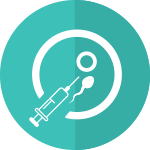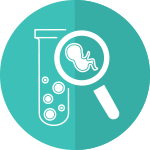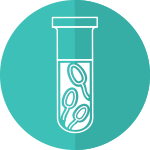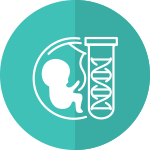- Physical Examination
- Initiating Ovarian Stimulation
- Egg Retrieval through Minimally Invasive Surgery
- Proceeding to Laboratory Procedures and Freezing Eggs (Free 1-year storage)
Egg Freezing
Egg Freezing is a modern medical technology used to preserve the viability of eggs for future fertilization during the most suitable age range. The optimal age range for fertilization is typically between 22 and 28 years. In the present day, there is a trend where people delay their marriages, and family planning often takes longer. This can lead to an increase in the woman’s age when she is ready to conceive, which can result in fertility challenges. Therefore, egg freezing during the appropriate age becomes a favorable option.
Furthermore, this technology is not exclusive to those who are already married. For single women in the modern era who want to plan their family and future childbearing, egg freezing is a good option. During the egg stimulation process, only the highest-quality eggs are selected, alleviating concerns about delayed marriage or saving money for family planning affecting future childbearing. Eggs can be preserved in their original state for up to 10 years, and when it’s time to use them, they can be thawed and used immediately.
Who is suitable for egg freezing?
- Individuals who are single or not yet married but have future plans for having children.
- Married couples who are not ready to have children at the moment.
- Individuals undergoing fertility treatments such as IVF or ICSI due to infertility issues.
- Individuals undergoing ovarian stimulation for IVF or ICSI and have obtained multiple eggs. The remaining eggs can be frozen for convenience in future cycles of fertility treatment or for future childbearing.
- In some cases, individuals with chronic conditions requiring radiation or chemotherapy treatment, such as cancer, or those who need to undergo ovarian surgery. These treatments can lead to reduced egg quality, making it challenging to conceive in the future.
Egg Freezing Process
- In the initial stage of egg freezing, the doctor will conduct a medical history taking and health assessment to determine the suitability and readiness of the body. Subsequently, appointments will be scheduled to begin ovarian stimulation.
- Ovarian stimulation involves injecting hormones to stimulate the ovaries to produce multiple eggs. This step requires daily injections of hormones for a period of 10-14 days. The number of injections will depend on the doctor’s discretion, hormone levels, test results, and the woman’s age to ensure the highest efficiency.
- During this time, the doctor will regularly examine the eggs to determine if they have reached the appropriate size and quantity (with a suitable size being no less than 18 centimeters). Once the hormone injection schedule is due, the doctor will administer an ovarian stimulation shot to mature the eggs and induce ovulation, causing the eggs to be released within a 36-hour window.
- In the egg retrieval process, the eggs are not collected through traditional surgical methods as many people might assume. Instead, the medical team performs the retrieval through the vagina (Minimally Invasive Surgery) after administering anesthesia. The next process involves using a tool which is a small needle attached to an ultrasound probe to locate and extract the eggs for laboratory examination. A concentrated cryoprotectant solution, combined with rapid nitrogen gas cooling, is then used to quickly freeze, and preserve the eggs in optimal condition for storage. This procedure allows the eggs to be stored for more than 10 years.
Disadvantages of Egg Freezing
Although egg freezing has its benefits in terms of preserving high-quality and optimal-age eggs for future fertility treatments, there are also disadvantages to consider. One of the main drawbacks is the relatively high cost (approximately 120,000++ baht per year). Additionally, once the eggs are retrieved, they cannot be re-implanted into the uterus. As a result, if one is ready for conception, external fertility treatments like IVF or ICSI must be employed.










